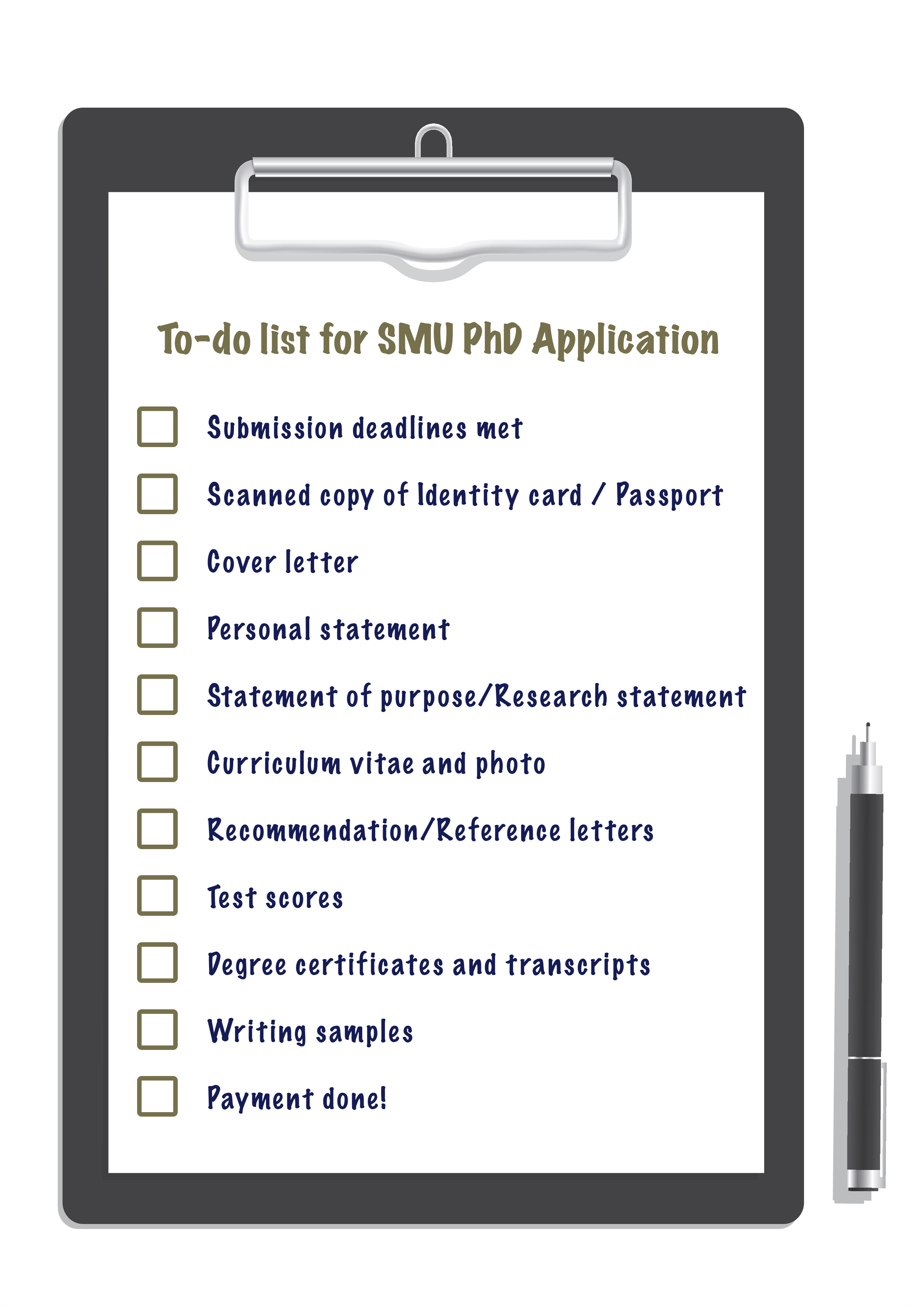By the SMU Postgraduate Research Programmes Team
An inclination to thinking critically; a drive for creating innovative solutions to problems; a strong passion for research—if you’ve checked all three boxes, a PhD would be would be just right up your alley.
So you’ve done your “research” and here you’ve found the SMU PhD programme. That’s great, but how do you apply?
Don’t worry, we’ve got you covered. Here’s a checklist of what exactly you’ll need to get the application process done up in no time. As the saying goes: The early bird catches the worm.
1. Deadlines
Applications for the August intake must be received by 31 January of the intake year; and yes, it must be in English. Don’t miss the deadline!
Now, for the PhD in Information Systems programme, there is actually another intake in January as well, with the application deadline always set on 30 June of the prior year.
SMU uses an online application system so most of the documents must be submitted electronically, except for official transcripts (which would have to be submitted by applicants via post) and referee letters (which would be submitted by the referees directly), unless indicated otherwise.
2. Identity Card/Passport
If you’re a Singaporean or Singapore Permanent Residents you’ll need to provide a scanned copy of either your NRIC or Passport’s personal information page.
Not a Singaporean or Singapore PR? If you’re an international applicant, you should provide a scanned copy of your Passport’s personal information page.
3. Cover Letter (a requirement for the PhD in Business programme)
Applying to a PhD programme is like applying for a job. Make sure that whatever you write is relevant to the kind of work you want to do at SMU, and why you feel you would be successful at it. The cover letter is where you can tell us what you want to study at SMU, and at the same time, introduce your background to us and the reasons you believe would make you a strong candidate for our PhD programmes.
4. Personal Statement
If the programme requires a personal statement, introduce us to your background and tell us why you would make a strong candidate for the PhD programme that you are applying to. You can choose to talk about how you developed an interest in the field or research area(s) of interest, issues that are important and/or interesting to you, and experiences that have shaped who you are today.

5. Statement of Purpose /Research Statement
While the personal statement tells us about your background and general academic interests, the statement of purpose/ research statement is about what you want to do at SMU. Tell us what you want to study and why you want to do research here at SMU, and even give us the names of the faculty members you would like to work with.
Tell us more about your academic and research skills and experience, and the unique academic and professional opportunities SMU could give you compared to other universities within Singapore or elsewhere. If possible, discuss some theories and methodologies that have influenced your thinking and that you hope to use in your research here.
6. Latest Curriculum Vitae with Recent Photograph
Much like a Curriculum Vitae (CV) that you would use to apply for a job, you want to highlight your academic background, research and conference experience (if any), and a list of publications (if any). Make sure your CV is organised clearly and free from spelling and grammatical errors.
7. Recommendation and/or Reference Letters
Having strong recommendation/reference letters from professors or faculty members who have personally taught or worked with you would definitely be an advantage, especially from those who are familiar with your field. Most programmes require two recommendation/reference letters, and the PhD in Business (Organisational Behaviour and Human Resources) requires three. As quality matters more than quantity, provide only what is relevant for the programme you are applying to.
Make sure you check with your referees beforehand, whether they would be comfortable writing you a good recommendation and ensure they are aware of the deadlines. To make it easier for your referees and to ensure that you get strong letters, do the following:
- forward them information about the SMU PhD programme(s) which you are applying to;
- send them copies of your CV, statement of purpose, transcripts and research papers or assignments that you had done when you were a student in their respective courses.
Doing this would help them get a broad understanding of who you are and what you want to do, and will definitely allow them to tailor their letters to your application.
8. Test Scores
Ensure that you register for, and take the required tests (GMAT/GRE and/or TOEFL/IELTS) on time. Also ensure that you have the correct TOEFL, GMAT and GRE Institution Codes as stated in PhD Student Admissions on the SMU PhD website.
It is best to take the tests by early November to ensure that your results reach us on time or to give you time for a re-sit, if required. There are no minimum test scores as applications are considered holistically.
9. Degree Certificates and Transcripts
Official transcripts should be mailed to SMU. It is alright if you do not have all of your grades yet; send us what you have first, and we will advise you accordingly. Don’t forget to upload scanned copies of your degree certificate(s).
10. Writing Samples
Some programmes require a writing sample to assess your potential to conduct, analyse and communicate research. This can be an extract of your thesis, a final paper or any other academic written project that demonstrates your writing and research skills.
11. Application Fee and Further Steps
The application fee of S$15 is non-refundable. Shortlisted candidates will be contacted 6–8 weeks after the application deadline and may need to go through at least one interview by the respective programme faculty member(s).

We’ve got you covered with this ready-to-print checklist! Go ahead and click on it.
At SMU, we want you to have the best chance for success, so rest assured we will look at every application carefully to ensure that the candidates we pick have the potential to grow and succeed in our programmes.
We welcome enquiries at phd@smu.edu.sg though you may find that most of your questions may already be answered on our comprehensive SMU PhD website and on respective programme’s web pages (which you will find links to from the SMU PhD website).
Now that you have a clearer idea of what is needed, go ahead to click and print out this checklist and get started on your application. Remember, the closing date for the August 2017 intake is 31 January 2017! We wish you the best in your application, and look forward to seeing you at SMU soon!










